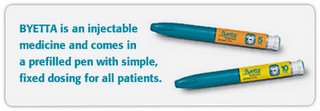 Diabetes Type 2
Diabetes Type 2Exenatide (marketed as Byetta)
Glucagon-like peptide-1 (GLP-1) is a GI peptide that stimulates glucose-dependent insulin secretion (similar to sulfonylureas). GLP-1 also inhibits glucagon release, gastric emptying and food absorption.
Byetta is a GLP-1 receptor agonist approved for adjunctive therapy for patients with DM 2 who are not well controlled on oral agents.
Byetta is administered SQ BID, just like NPH insulin. Nausea is a common side effect occurring in 40% percent of patients.
The advantge of using Byetta instead of insulin is the weight loss which can be significant. The NYTimes reported that Byetta is sometimes prescribed off-label to nondiabetic patients to induce weight loss. This use of the medications is discouraged by the manufacturer. Click here for FDA Patient Information Sheet for Byetta.
Another GLP-1 agonist is Liraglutide which is longer acting than Byetta and can be injected once a day.
FDA recently approved an inhaled insulin called Exubera which will surely be preferred by patients over any injectable diabetes drug. Exubera seems poised for an exuberant growth in its market share after its launch.
Related:
Wrong prediction -- Exubera was taken off the market in the second half of 2007.
Lilly Ends Effort to Develop an Inhaled Insulin Product. NYTimes, 03/2008.
Lilly, Amylin Disclose More Cases of Byetta-Related Pancreatitis. WSJ Health Blog, 08/2008.
FDA Issues Warning for Diabetes Drug Byetta about possible kidney problems, including renal failure http://bit.ly/1UOjwB
References:
Diabetes drugs that modify the intestinal absorption of food. UpToDate (paid subscription required)
GLP-1 and extra-islet effects. Horm Metab Res. 2004 Nov-Dec;36(11-12):842-5.
A Ray of Hope for Diabetics. NYTimes.
Novo Nordisk Shelves Inhaled Insulin. WSJ Health Blog, 01/2008.
Image source: Byetta.com
Alcohol Abuse
Acamprosate (marketed as Campral)
Campral is a structural analog of GABA, which can reduce the relapse rate in alcohol abuse. In a RCT, the rate of abstinence was higher with Campral (18 %) than placebo(7%).
Campral is well tolerated and was approved by FDA in 2004 for relapse prevention in patients who have already stopped drinking. The dose is 666 mg TID for 6 to 12 months.
FDA Patient Information Sheet
References:
Treatment of alcohol abuse and dependence. UpToDate (paid subscription required)
Updated: 11/03/2009